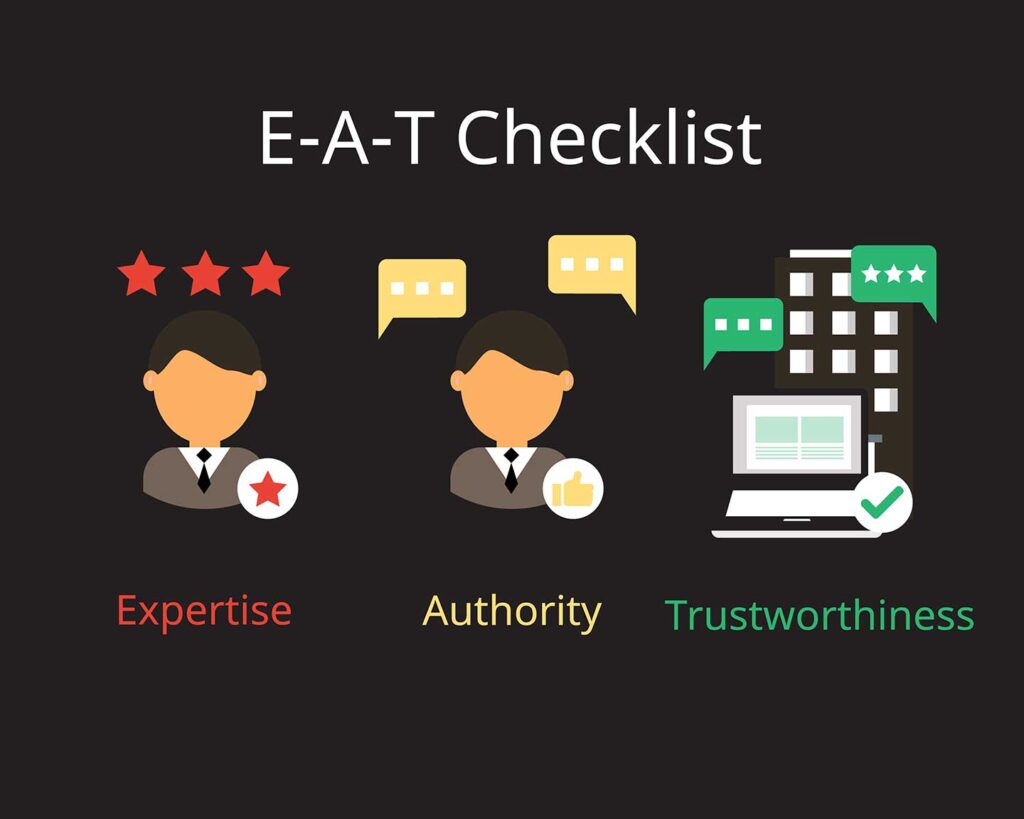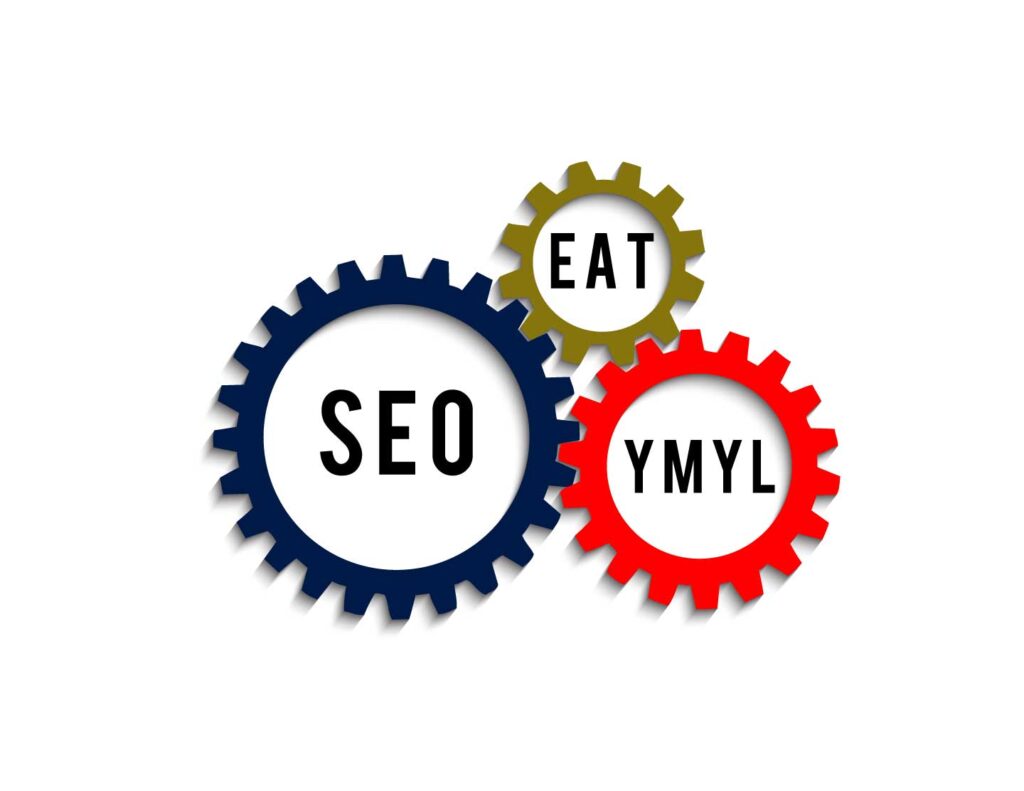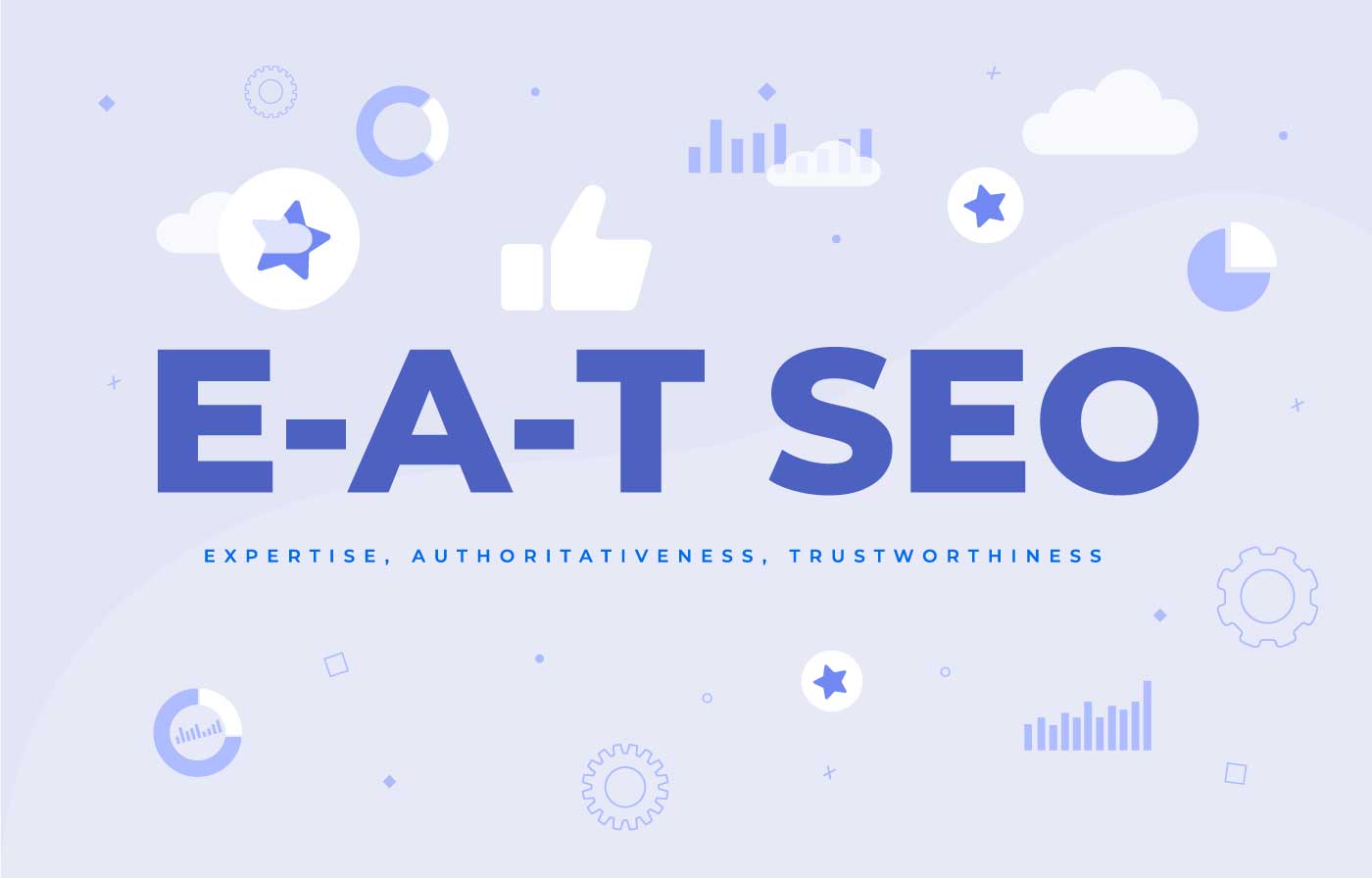The EAT and YMYL significance started in 2018, Google rolled out a major algorithm update to improve the trust and authoritativeness of sites’ rank in Google. It affected all searches, but the biggest impact was on health and wellness industry sites. This became known as the medic update.
Have you ever stopped to think about the quality of your content? How do we discern the trustworthy from the misleading in the vast world of the internet? Enter EAT & YMYL – two acronyms that have become indispensable in SEO and content quality.
The importance of E-A-T (Expertise, Authoritativeness, Trustworthiness) factors for improving Google search rankings, especially for YMYL (Your Money, Your Life) websites. Let’s deep-dive into their significance.

What is EAT?
The Components of EAT
Expertise: How knowledgeable is the author on the subject?
Authoritativeness: What qualifies them to speak on the topic?
Trustworthiness: Can the information be relied upon?
Think of EAT like a three-legged stool. Without one, the structure crumbles. It’s not just about knowledge but credibility and reliability.
Why is EAT Important?
EAT, which stands for Expertise, Authoritativeness, and Trustworthiness, is a crucial ranking factor for several reasons:
- User Trust: In a digital age where misinformation can spread rapidly, EAT is a benchmark for users to trust the content they consume. When content on YMYL websites displays expertise, authority, and trustworthiness, users are likelier to rely on and engage with it.
- Quality Control: EAT criteria help ensure that the content provided to users is high quality. This is particularly essential for subjects that can directly impact an individual’s health, finances, or well-being.
- SEO and Rankings: Search engines like Google phttps://webnaya.com/wp-content/uploads/2023/03/a64267e5-0da8-4d2e-a632-8467ad1245b3-1.jpgritize delivering the best content to their users. By adhering to EAT principles, content creators can enhance their chances of achieving higher search engine rankings.
- Combatting Misinformation: EAT guidelines assist in filtering out content that might be misleading or incorrect. This is especially important in the health, finance, and news sectors, where misinformation can have dire consequences.
- Credibility and Reputation: For brands and websites, adhering to EAT principles can enhance their online reputation and establish them as credible sources in their respective niches.
- User Experience: Content that aligns with EAT principles typically offers a better user experience. It provides valuable, accurate, and reliable information, which users often seek.
EAT is a set of guidelines and a commitment to providing users with accurate, reliable, and valuable content. It acknowledges content creators’ responsibility to deliver trustworthy information and high-quality content in an age of digital abundance.
Delving into YMYL
YMYL Defined
Your Money or Your Life. Sounds dramatic, right? YMYL pages are those that could potentially impact a person’s future happiness, health, financial stability, or safety. Any site offering advice about those topics will be considered a YMYL site. So, Google will carefully judge any website offering advice about anything that will materially affect a visitor’s life or finances.
Categories of YMYL Pages
Health and Safety
Financial advice
Legal matters
News and current events
Groups or individuals based on characteristics like race, religion, gender, etc.
Have you ever read an article on health or finance and wondered if following its advice could be detrimental? That’s where YMYL comes in, ensuring the stakes aren’t just high and credible.

How EAT & YMYL Intersect
EAT (Expertise, Authoritativeness, and Trustworthiness) and YMYL (Your Money or Your Life) are two concepts that play pivotal roles in the realm of content quality and SEO. While they are distinct concepts, their intersection is crucial in understanding search engines’ emphasis on high-quality content. Here’s how they intersect:
- Foundational Principles: Both are rooted in the idea of content quality and trustworthiness. While EAT defines the criteria for what makes content credible, YMYL identifies the types of content that have significant implications on a user’s life, be it financially, health-wise, or otherwise.
- Elevated Stakes for YMYL Pages: Content that falls under the YMYL category is held to an even higher EAT standard. Because these pages can influence critical aspects of a person’s life, such as their health, finances, or safety, the information they provide must be expert-backed, authoritative, and trustworthy.
- Enhanced User Protection: Both factors intersect fundamentally about user protection. Search engines want to ensure that users receive accurate information and are protected from potentially harmful or misleading content, especially in high-stakes areas like health or finance.
- SEO Implications: For pages that fall under this category, adhering to EAT principles is particularly crucial for search engine rankings. Given the potential impact of YMYL content on users, search engines phttps://webnaya.com/wp-content/uploads/2023/03/a64267e5-0da8-4d2e-a632-8467ad1245b3-1.jpgritize pages that display strong expertise, authority, and trustworthiness.
- Content Evaluation: When assessing the quality of those pages, the EAT criteria serve as a guideline. In essence, YMYL defines the “what” (i.e., which pages are of high importance), while EAT defines the “how” (i.e., how these pages should be evaluated in terms of quality and trustworthiness).
While EAT provides a framework for evaluating the quality of content across the web, YMYL pinpoints the areas where this quality is of utmost importance. Their intersection underscores content creators’ responsibility to create accurate, safe, and beneficial content for users.
Tips for Boosting EAT & YMYL in Your Content
Cite Reliable Sources
Remember in school when you were told to cite your sources? It still holds. Credible references bolster your content’s trustworthiness.
Showcase Your Credentials
Why should readers trust you? If you’re an expert, flaunt it! Display your qualifications, experience, and any other credentials.
Encourage User Engagement
Comments, reviews, and feedback can serve as testimonials, further enhancing your content’s EAT.
The Future of EAT & YMYL
In an ever-evolving digital landscape, the significance of EAT & YMYL will only grow. As search engines strive to offer the best user experience, these metrics will remain pivotal in determining content quality.
Conclusion
In the end, EAT & YMYL are more than just acronyms. They’re the bedrock of what Google wants in a digital age. As consumers, they guide us. As creators, they challenge us. But most importantly, they remind us of the impact our words can have. Isn’t it time we paid attention?
FAQs
What does EAT stand for?
EAT stands for Expertise, Authoritativeness, and Trustworthiness.
Why are EAT & YMYL crucial for SEO?
They help ensure that content is relevant and trustworthy, which is essential for a positive user experience.
How can I improve my content’s EAT?
Cite reliable sources, showcase your credentials, and encourage user engagement.
Are all pages considered YMYL pages?
No, only those that could potentially impact a person’s future happiness, health, financial stability, or safety.
Can EAT & YMYL affect my site’s ranking?
Absolutely! Search engines phttps://webnaya.com/wp-content/uploads/2023/03/a64267e5-0da8-4d2e-a632-8467ad1245b3-1.jpgritize quality, and adhering to EAT & YMYL guidelines can positively impact your ranking.


